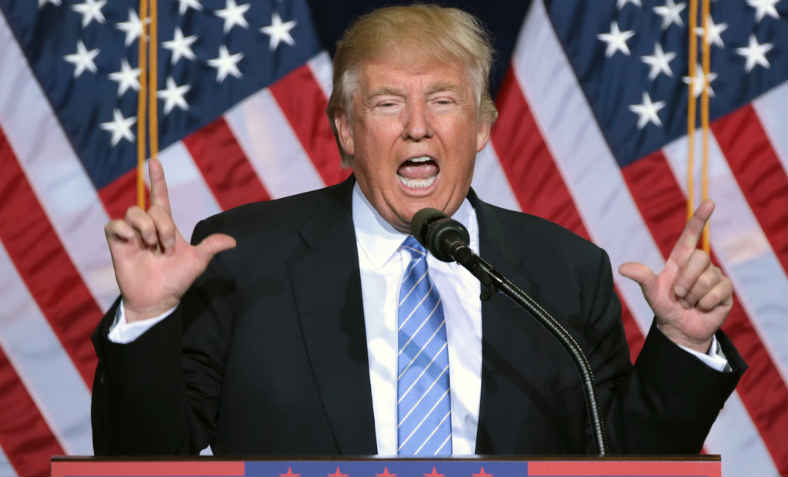 Donald Trump speaking to his supporters in Phoenix, Arizona, 2016. Photo: Gage Skidmore
Donald Trump speaking to his supporters in Phoenix, Arizona, 2016. Photo: Gage Skidmore
Is Trump a symptom or a cause of the rot at the heart of the US empire, asks Des Freedman
While it’s certainly true that the US is no longer the world’s sole economic power, the US economy is still 1.6 times bigger than China with 25% of the world’s economy compared to China’s 15%. The decline of US economic power is going to be played out over a number of years – it’s a drawn out process rather than a sudden transformation and, despite what some commentators predicted, Trump has taken energetically and dangerously to his task to maintain US power in an increasingly unstable and multipolar world.
There are a couple of different ways of thinking about Trump.
First, that he’s a joke, a distraction from the serious business of challenging US hegemony in the shape of the military-industrial establishment and embedded corporate power. Noam Chomsky has argued that ‘Donald Trump is a clown – literally, he could be in the circus.” This is the popular image of Trump the buffoon, whose ego, short attention span and generally infantile behaviour mark him out as a jester when we should really be focusing on generals and top bosses.
Second, that’s he’s far from a clown and in fact has ushered in an authoritarian regime that effectively is bringing US closer to or on the brink of fascism. While Trump is undoubtedly a racist, a misogynist, an Islamophobe and a bully, he has not set up a fascist state with armed militias on the streets and the scrapping of all vestiges of democracy. Supremacism has been bolstered by the racists inside the White House but there is still, in formal terms, freedom of movement, freedom of expression and political opposition.
That’s not to say that Trump isn’t comfortable with the trappings and the aims of fascism and supremacism – witness his appalling justification of the murderous violence in Charlottesville last summer when Nazis went on the rampage in Virginia killing a protestor and where all Trump could do was to equate the violence of both sides. Just think of the horrendous policies he has fought for – from his travel ban mostly applied to Muslim countries to his disgusting ‘zero tolerance’ policy towards undocumented immigrants, which has seen the US government presiding over the separation of parents from their young kids, putting people in cages and building camps for detainees.
The lesson from this is not that we sit back complacently but that we urge more resistance and demand an end to the normalisation of fascism. There was an outrageous report in the New York Times in 2017 which responded to Charlottesville by reporting on what it called ‘the Nazi next door’ and telling readers what a normal guy this particular fascist was and where he shops and what he eats. There is nothing ‘normal’ about Nazis and normalising their behaviour is just a step towards legitimising racism and genocide.
Neither position is helpful. As ridiculous as Trump is, there is nothing clownish about his behaviour and his impact on domestic and world politics. But neither is Trump completely unprecedented and a clean break with traditional politics; he’s repugnant but he’s a repugnant version of the worst presidents who came before him and who were equally implicated in giving tax cuts to the rich, bombing innocent people, invading countries and scapegoating minorities to win votes.
Trump is deadly serious and we need to be deadly serious about him. This is a man who is committed to launching trade wars, embracing protectionism and ramping up international insecurity. Trump was serious when he pulled out of the Iran nuclear deal, the Paris climate accord, UNESCO and the UN human rights council. He’s far from a clown when he’s escalating US drone strikes in countries like Afghanistan, Iraq, Syria and Yemen precisely to demonstrate US military strength as a signal to China and Russia that the US isn’t going anywhere. And this is what makes him so dangerous and US foreign policy so explosive because it’s tied to retaining military dominance and attempting to control global resources even if US power, objectively speaking, is declining.
Where there is horror, there are also grounds for optimism. Trump has never won majority support with approval ratings hovering around 40% throughout his presidency. Most importantly, there are more and more examples of resistance. There were around 750 protests against Trump’s barbaric immigration policy of forced separation at the end of June and there’s been an upsurge in socialist politics. It’s hard to overstate the impact of the recent victory in the Democratic congressional primary in New York for Alexandria Ocasio-Cortez, a supporter of Bernie Sanders and a self-proclaimed socialist, who beat an experienced Democrat who had a lot more money and contacts but who crashed out because establishment politics just didn’t cut it with most voters.
The conditions are ripe, therefore, for anger and outrage to be turned not against minorities and immigrants as Trump has tried to do but into concrete support for everything that he stands against: social justice, anti-racism and socialism. We can play our part by making sure that our actions against Trump – the representative of what remains the world’s most powerful state – are as large, vibrant and militant as possible, and by always recalling the chant of 1968 Democratic National Convention protesters: “The whole world is watching”.

